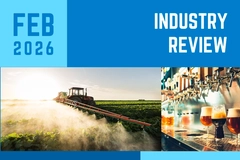
- Industry news
Industry news
- Category news
Category news
- Reports
- Key trends
- Multimedia
- Journal
- Events
- Suppliers
- Home
- Industry news
Industry news
- Category news
Category news
- Reports
- Key trends
- Multimedia
- Events
- Suppliers

Carbon footprinting and labelling tells us with milk that it's the agricultural stage that accounts for by far the biggest portion of the carbon footprint. And the biggest factor here is methane emissions from the cows themselves.

19 Aug 2009 Tesco full fat, semi-skimmed and skimmed milk ranges will display the carbon footprint label as part of the company’s groundbreaking work to include carbon labels on Tesco products.
Helping to raise awareness of climate change and the carbon impact of products, it is a major milestone in the company’s pledge to have footprinted 500 products by the end of the year.
The move to carbon footprint this essential, top selling family item comes on the back of new independent consumer research which found that 50 per cent of customers surveyed now understand the correct meaning of the term ‘carbon footprint’, compared to only 32 per cent of people surveyed in 2008*.
The survey also revealed that customers increasingly want to be green. Over half said they that would seek lower carbon footprint products as part of their weekly shop, compared to only 35 per cent last year. They felt it was important to have the right information about the carbon impact of products to help them make informed choices.
Tesco Community and Government Director, David North said; “The pint of milk is an iconic part of British family life. So we're using it to play an important new role in helping our customers understand climate change, the carbon footprints of products, and what steps they can take to help. Milk is not only one of the biggest sellers in store; it's also prominent on breakfast tables day in day out across the country. So we think carbon labels on milk can play a great part in raising awareness and helping customers navigate the new carbon currency.”
Carbon footprinting and labelling tells us with milk that it's the agricultural stage that accounts for by far the biggest portion of the carbon footprint. And the biggest factor here is methane emissions from the cows themselves.
Tesco is already working to reduce these emissions alongside the dairy industry and farmers through the Tesco Sustainable Dairy Group and Dairy Centre of Excellence.
“We are currently embarking on a number of research projects to reduce the carbon emissions from milk production. For example, we're working on using different feeds that might help reduce methane emissions from cows, and encouraging the use of renewable energy on farms” said Tesco Director David North.













